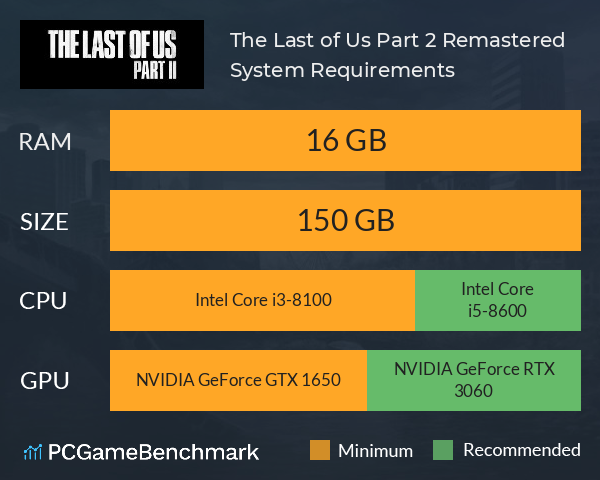The Last of Us Part 2 Remastered requirements
Full Last of Us Part 2 Remastered requirements on PC and laptop, including minimum and recommended specs for Windows 10 PCs and laptops.
| Minimum | Recommended | |
| CPU | Intel Core i3-8100 or Ryzen 3 1300X | Intel Core i5-8600 or Ryzen 5 3600 |
| Graphics Card | NVIDIA GeForce GTX 1650 or Radeon RX 5500 XT | NVIDIA GeForce RTX 3060 or Radeon RX 5700 |
| RAM | 16 GB | 16 GB |
| File Size | 150 GB | 150 GB |
| OS | Windows 10 64-bit or higher | up to Windows 11 |
Can you run it? Test your computer against The Last of Us Part 2 Remastered system requirements.

Can I Run The Last of Us Part 2 Remastered?
To run The Last of Us Part 2 Remastered requirements, you'll need a Windows 10 PC, with an NVIDIA GTX 1650 GPU, an Intel i3-8100 CPU, 16GB of RAM, and 150GB of SSD space.
At long last, The Last of Us 2 has arrived on PC with a remastered edition. The developer revealed that the official The Last of Us Part 2 Remastered PC requirements are actually pretty accessible. Though, unfortunately, said requirements do demand a significant chunk of storage space and RAM, which could prove mildly challenging for older laptops and gaming PCs.
The Last of Us Part 2 Remastered minimum requirements demand, at the very least, an AMD Radeon RX 5500 XT graphics card, an AMD Ryzen 3 1300X processor or better, and 16GB of RAM on Windows 10 or 11 systems. This is just enough hardware to get the game up and running, albeit on the lower end of the game's graphics settings.
To play the game at its best and meet the The Last of Us Part 2 Remastered recommended specs, you will require something as beefy as an NVIDIA GeForce RTX 3060 GPU, an Intel Core i5 8600 CPU, and 16GB of RAM.
Still unsure if you can meet our The Last of Us 2 requirements? Take our benchmark test using our automatic checker or by manually entering your system details to see how well you can run the latest Last of Us experience.
The Last of Us Part 2 Remastered size - How big is The Last of Us Part 2 Remastered?
The Last of Us Part 2 Remastered download size on PC requires 150GB of SSD space. This is almost double the console download size, which required just 78GB to 100GB of space.
So, if you need more space or want to make an upgrade, check the PCGamesN buyers guide for the best SSD for gaming or just check the latest, best prices for SSDs.
The Last of Us Part 2 Remastered Steam Deck
Despite the relatively chunky Last of Us Part 2 specs, the Last of Us Part 2 Steam Deck rating sits at "Verified", indicating that the game will run without issue on Valve's handheld console.
The Last of Us Part 2 Remastered will run on PC system with Windows 10 64-bit or higher and upwards.
Looking for an upgrade? See our graphics card comparison and CPU compare for benchmarks. We'll help you find the best deal for the right gear to run the game.
The Last of Us Part 2 Remastered FPS - what frame rate can you expect?
How many FPS will I get on The Last of Us Part 2 Remastered? We reference thousands of reports from PCGameBenchmark users running our free tool on Overwolf to tell you exactly how The Last of Us Part 2 Remastered performs across a range of different settings and resolutions on the most popular PC gaming setups.
What frame rate does The Last of Us Part 2 Remastered run at?
Here are the typical frame rate samples
| Avg FPS | CPU | GPU | RAM |
| 174 | Intel Core i9-14900KF | NVIDIA GeForce RTX 4090 | 124 GB |
| 131 | Intel Core i7-10750H | NVIDIA GeForce RTX 2060 | 16 GB |
| 97 | Intel Core i7-6700 | NVIDIA GeForce RTX 2060 | 24 GB |
| 58 | Intel Core i7-6700K | NVIDIA GeForce GTX 1080 | 32 GB |
What frame rate does The Last of Us Part 2 Remastered run at? Check our FPS Calculator
Are you experiencing The Last of Us Part 2 Remastered FPS drops and stutters? Want to know exactly how the game performs on your system? You can get a free easy FPS test for all your games using the PCGameBenchmark FPS monitor tool - your first step to understanding how the parts in your gaming PC are actually performing in real-world conditions.
